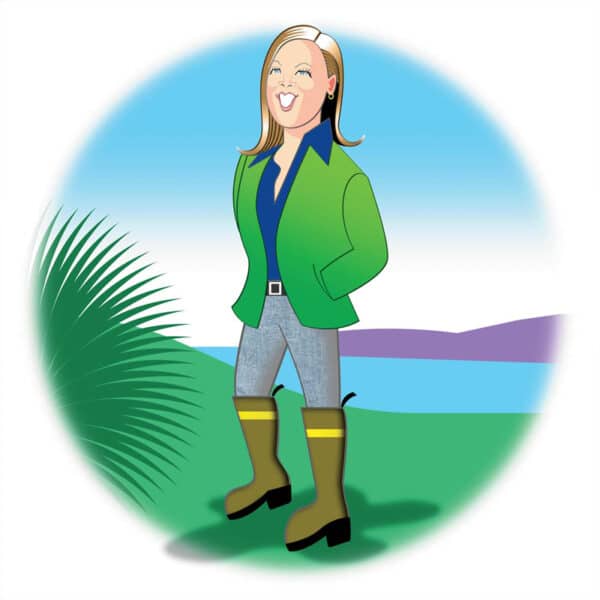PROTECT AND PRESERVE
By Thomas Connors
ILLUSTRATION BY ROBERT RISKO
By Thomas Connors
ILLUSTRATION BY ROBERT RISKO

From wildfires and drought to severe winter storms and flooding, 2024 was a tough year for the nation. The toll for these natural disasters totaled $182.7 billion. And we’re not alone. Over 13 million acres burned in Canada while devastating floods impacted Spain, Afghanistan, and Brazil. The Nature Conservancy (TNC) is front and center in highlighting these challenges and advancing global solutions.
Founded in Arlington, Virginia, in 1951, TNC is a global organization, operating in 81 countries and territories and all 50 states. The organization has strong roots in Chicago, where Executive Director and Midwest Partner Georgie Geraghty leads a team of 80. “Chicago is an extremely important player in the global conservation arena, not just because it is the third largest market in the U.S. and an important source of private philanthropy,” explains Geraghty, “but because of the presence of 40 Fortune 500
companies, top research institutions, and a proven track record of world-class conservation projects related to freshwater
and prairie restoration.”
Geraghty spent summers with her parents and sisters in a one-room cabin in the shadow of Wisconsin’s Nicolet National Forest. “I never considered these natural places threatened until we stumbled across an illegal dumping site filled with mangled cars, rusty appliances, and garbage.” Geraghty became interested in environmental law because it combined her love for the outdoors and her interest in public service. After earning an undergraduate degree in public policy from Princeton University, she obtained a master’s degree in forestry from the University of Oxford and a law degree at Yale.
An environmental attorney who served as a lecturer at the University of Chicago Law School and as an adjunct faculty member at the Northwestern University Pritzker School of Law, Geraghty first joined TNC in 1988 after working in business development at General Electric. In 2016, she joined the Illinois chapter and served as deputy director before taking on her current role. “My principal focus areas are securing resources to support our work around the globe, building and engaging with our Illinois Board, and developing partnerships with governmental entities, other NGOs, and businesses,” says the Glencoe resident. “Underlying my work is a need for people to be more aware of TNC in Chicago and beyond. We have always been a ‘quiet’ organization, working behind the scenes to get the job done. Striking a balance between generating the awareness necessary to secure resources and being laser-focused on our on-the-ground conservation work is something I wrestle with every day.”
Twenty-five years ago this year, TNC acquired a 6,000-acre farm adjacent to the Illinois River in Lewistown that was created 80 years ago by draining extensive wetlands that had once been prime habitat for migratory birds, fish, and mussels. “By reconnecting these lands to the Illinois River,” explains Geraghty, “we have re-established the relationship between the river and its floodplain, replicating the natural cycle of flooding. This project, known as TNC’s Emiquon Preserve, has become a world-renowned model for floodplain restoration, and our techniques are being replicated world-wide.”
Although it’s easy to think of the Conservancy’s work solely in terms of rural, wide-open spaces, TNC does not neglect the urban environment. In Chicago, the organization is working to improve the tree canopy, because trees help improve air quality, reduce air temperature, and lower cooling costs. “Heat waves and air contaminants are major threats to our cities. Planting trees is a solution tightly connected to public health,” observes Geraghty.
Securing a healthy environment requires legislation and policy implementation, none of which happens overnight. Yet, simply stepping outside can heighten our appreciation for the natural world and create a sense of responsibility to protect it. “Whether walking along the lake or just puttering in one’s backyard, taking time to look can lead to curiosity, wonder, and gratitude,” she suggests. “This is the foundation of conservation.”
For more information, visit nature.org.
Sign Up for the JWC Media Email